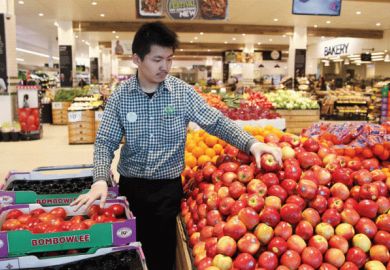Australia’s fourth biggest city is negotiating to be deemed a regional centre in a bid to boost its allure to foreign students.
Mark McGowan, the premier of Western Australia, told a Perth conference that the city of more than 2 million people had been sidelined by new federal visa and scholarship incentives designed to attract students to regional Australia.
“Unfortunately, WA has no regionally based universities – only smaller satellite campuses,” he told the Australian International Education Conference. “WA is at a disadvantage to the other states.”
Dan Tehan, the federal education minister, had earlier told the conference that the economic benefits of international education should be shared “with all Australians” – including those in regional areas, which foreign students largely avoid.
In a televised message, Mr Tehan said the recently announced A$94 million (£50 million) Destination Australia scholarships would bring almost 5,000 foreigners to regional campuses.
The government has also granted an extra year of post-study work rights to international students who graduate from regional campuses. Under its definition, “regional” means anywhere outside Sydney, Melbourne, Brisbane, Perth and Queensland’s Gold Coast.
Perth’s status as a regional destination for visa purposes was revoked in late 2017 – meaning that foreigners who study there miss out on the new benefits, unlike those in Adelaide, Canberra, Darwin and Hobart.
Mr McGowan said every university in the state was concerned about the imbalance. “We share those concerns. We don’t want WA to be left out when it comes to attracting new students. We want Perth to be a place where the best and brightest from around the world start their careers,” he said.
He added that the state government had been working with the federal finance minister, Mathias Cormann, a Western Australian senator, to change the rules. “We hope to have a resolution soon, so that you can tell your students that they can and should come to Perth,” he said.
“They can work and gain experience in…an unparalleled place to launch a career, with some of the nation’s biggest employers.”
Work rights have been a dominant topic at the conference, with new reports highlighting their importance in attracting international students – notwithstanding questionable outcomes for graduates, many of whom end up working in low-skilled jobs.
Mr McGowan’s government scored an own goal in 2017 when it bowed to union demands to cut skilled migration by axeing a migration points scheme for immigrants wanting to settle in the state. This triggered a plunge in foreign enrolments as students gravitated to states that had retained the scheme, such as South Australia and Tasmania.
Last year, his government tried to stem the losses by introducing a graduate occupation migration list. It gives foreign graduates with skills in priority areas, particularly those with postgraduate qualifications, the option of applying for permanent residence.
Mr McGowan told the conference that the scheme would be tweaked to attract more overseas students. He said the graduate migration visa stream had been realigned with the state priority occupation list, “giving students access to a wider range of jobs when they choose WA”, while eligibility would be extended to vocational education students.
In an upbeat speech, he lauded Perth’s universities, infrastructure and “some of the best beaches in Australia”.
“Unlike Sydney, you can get to our beaches,” he said. “And unlike Melbourne, our beaches are worth going to.”
Register to continue
Why register?
- Registration is free and only takes a moment
- Once registered, you can read 3 articles a month
- Sign up for our newsletter
Subscribe
Or subscribe for unlimited access to:
- Unlimited access to news, views, insights & reviews
- Digital editions
- Digital access to THE’s university and college rankings analysis
Already registered or a current subscriber?








